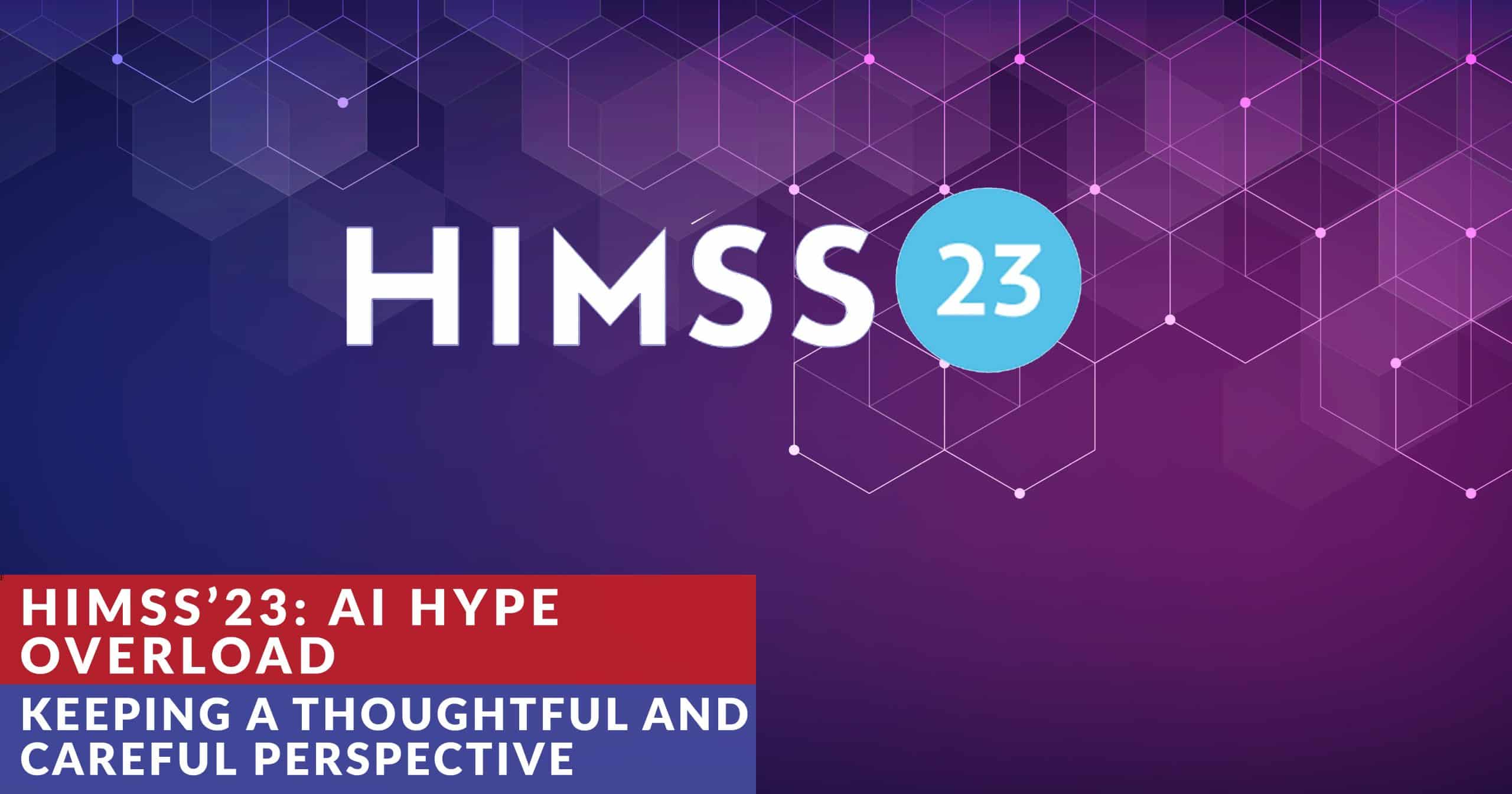Be careful what you wish for sure did apply to this year’s mHealth Summit, which was held last week in Washington D.C. Of the some 4,000 in attendance, I was one of the 10% or was it even 1% of those present that have attended all four events in succession. It is with that perspective that I came away from this year’s mHealth Summit more disappointed than ever.
At previous mHealth Summits, I often bemoaned the lack of organization of the conference, the often bizarre exhibitors one would find (couple of years back one exhibitor, and I kid you not, was marketing herbal aphrodisiacs) and basic necessities one would find at virtually any event, breaks with coffee, maybe a snack here and there. This disorganized, but charming event was mHealth Alliance Summits of years past.
After an initial partnership last year with the NIH Foundation, the original organizers of the mHealth Summit, HIMSS formerly took over the mHealth event this year. The result, a much more well organized registration process, greater focus on the exhibition area and a definite improvement on basic event logistics.
Unfortunately, HIMSS was less successful in improving the content of the numerous sessions that were held. It seemed that anyone with an idea for a topic was given a stage to stand on, or at least a panel to participate on even if what they had to say had very little to do with the session topic.
The exhibit area, while improving, still lacked a core constituency, HIMSS’s bread n’ butter customer base, the traditional HIT companies that one finds at the national HIMSS conference. This struck me as quite surprising as we are now beginning to see EHR vendors finally release solutions that truly enable physicians to use their tablets for bi-directional interaction with a healthcare facility’s core health information system.
But there were two things I found most disturbing about this year’s event. The first was how HIMSS handled the keynote presentations. From this vantage point, it appeared that each and every one of keynote was simply sold to the highest bidder and since they were sold, the winning bidder felt that their keynote provided them the opportunity to sell the audience on their concept, their product, their platform for mHealth. It was horrid to watch and cheapened this event to a level it has never seen in its short history. Seriously HIMSS, today you have enough clout in the market to not stoop this low so why did you?
Another big omission in the main stage was the lack of clinicians discussing the potential use cases for mHealth, the challenges to adoption, the challenges to link into legacy systems and how they see mHealth evolving in the future to meet their care delivery needs. THere could have been some stunning visionary talks on the topic, but none were to be found at this year’s Summit.
The other disturbing issue relates more to the industry itself and those positioning themselves to be the leaders in the mHealth market. Companies such as Aetna, AT&T, Qualcomm, Verizon, et. al., all spoke about an open platform for mHealth applications. Of course each of them was talking about their own proprietary “open platform” that they are hoping will become the de facto standard in this industry sector. Problem is: none of them have the consumer traction, nor a compelling enough vision to gain a critical mass of developers for their specific platform. There are no “Apples” in this bunch.
The need for a common set of standards that will allow mHealth apps to cross-talk to one another is a serious need in this sector, Without such standards, mHealth will never truly blossom into its full potential and remain the sideshow that it is today. Now, if we could get these big players to all agree that mHealth is far more important than any single one of them, that competing via proprietary platforms is a dead-end, then maybe we will finally get somewhere.
Note: As mentioned previously, we are getting ready to switch to a completely new site. THerefore, while you can leave comments here now for discussion, it is unlikely that they’ll be transfered over to the new site.




Well said, John. While I didn’t make it this year, your comments remind me a lot of what I saw last year. The exception, of course, being Eric Topol’s keynote, which was the highlight of the conference and brought the roof down. If only we had more speakers like him who are not company / organization pitch men / women.
HIMSS is a construct of a bygone era where silos are the rule, social media is unsafe and the Internet is unprofessional. It sounds like mHealth is another example of incumbents using the power of their purse to try and hold back the forces of disruption. It’s unreasonable to expect HIMSS as a governance mechanism to come up with either standards or conferences that reflect the realities of today’s health reform and collaboration realities.
Rent-seeking behavior around patient data is no longer viable. The sooner the companies that support HIMSS get your message, the better.
Is it me or does it really seem like the convention promoters and incubators are the ones getting the most traction (profitability) in the mHealth – Health 2.0 space???
“The need for a common set of standards that will allow mHealth apps to cross-talk to one another is a serious need in this sector, Without such standards, mHealth will never truly blossom into its full potential and remain the sideshow that it is today.” Absolutely correct John and on a brighter side, I am seeing indications that Standards Development Organizations and the International Community are showing renewed impetus to work towards the development of such standards. Of course actions speak louder than words, but you’ve hit the nail on the head in terms of the next, most crucial push in the market.
It’s interesting that Continua Health Alliance has developed wireless standards for the health industry (reference “Continua’s 2012 Design Guidelines”, a discussion started by Clint McClellan, President and Chairman of the Board
Continua Health Alliance in the Digital Health group: http://lnkd.in/dHN95p), but there’s nothing I’m aware of in this regard for health apps. Does anyone know organizations doing this? Is the issue that there’s no money (relatively speaking) on the health app side, hence no organization(s) formed around fostering it, e.g. via standards?
Adrian’s comment is also noteworthy.
Well stated, Paul. Happtique is trying to do exactly what you describe for health apps. The final standards will be released in the very near future. Though they are not binding and the Certification Program will be voluntary, it is hoped that the standards will become blueprints for the development of quality apps. These are not necessarily complete technical standards but those relevant to security, privacy, operability and content. I look forward to developers adopting them.
This was my first mHealth as an attendee and speaker. I was also concerned about the absence of existing healthcare providers and investors. We had mostly entrepreneurs talking to entrepreneurs and drinking their own Kool -Aid..a common complaint heard also from the exhibitors I talked to. Successful companies will have to work within the evolving healthcare delivery system..not as stand alone product…and will need to be able to demonstrate their value proposition and revenue model.
Anne, I come from the clinical side and have moved through 1.0 now 1.0 Redux (Health 2.0) and can not agree with you more. Positioning against the various flavors of ACO, PCMH, MLR and others yet to come means positioning at the points of concentration, traction and sustainable revenue streams.
Jim, I do believe that ACOs will facilitate mHwalth adoption. I don’t think PCMH nor MLRs will motivate adoption. I believe that payers are important as well (http://davidleescher.com/2012/12/02/why-payers-are-critical-to-mhealth-adoption/). ACOs and payers will recognize the ROI of investing in these technologies. It is unfortunate that there are very few studies looking at ROI. I agree with Ann that companies with multiple technology offerings will be successful over those with a single product. The Kool Aid effect will decrease when adopters call on developers to demonstrate efficacy (payers will want this). I look forward to clinical studies being a bigger part of conferences in the future. The large companies seen at the Summit are in a position to hopefully get these studies done in partnership with academic/clinical centers like Verizon-Duke University.
Studies from the early days of PDAs in the 90s, as some mHealth studies today, show the more utility a device had married together the steeper the adoption curve. Just as DNLA standards have married the audio/video world we need this to happen quickly for healthcare. ..I think Qualcomm is on to this. It’s not about how many technologies or apps are in a device it’s about the overall utility it easily delivers to the professional and passively to the consumer/patient – professionals like consuming tech, nobody likes consuming healthcare.
Jim, I’d go farther and say that the more a technology addresses a real clinical problem, the more it will be adopted. I would also submit that the passive side will need to be the healthcare professional. Docs are in survival mode and will not expend any energy on these new technologies unless it eases their workflow.
Dave: Hadn’t thought about the professional being passive. If in survival mode there will be those who become more competitive and look to tech as a competitive weapon that not only solve the clinical workflow/coverage problem, but helps brand them in a community…and those who will be like the older docs and just retire. How about if a tech makes them more money too?? we should talk.
I agree, Jim. There are already different camps out there in both the hospital and physician communities re: relative worth of mobile technologies. Another aspect of physician passiveness is that they only want actionable alerts from data. Data which does not change a way of managing a patient will not be useful. The first questions physicians ask about patient-derived data is “Am I going to be bombarded with useless information?” Physicians already literally sign off on and address useless regulatory requirements and paperwork (yes there is still a lot of paperwork involved in healthcare).
It’s interesting to me that for all the talk about architecture and standards no one here mentioned Open mHealth (openmhealth.org). They did have a presence both on the exhibit floor and a special session. There display on the exhibit floor was more modest than the big commercial vendors but they did attract some attention.
Anyone who is of the opinion that ACO’s will “pay” for these apps has yet to attend any ACO event or talk to those running or “standing up” ACO’s. First of all, today’s ACO shared savings programs are for Medicare populations, and while certainly care givers are involved getting an ACO to pay for an app that may or may not be used by the end user is questionable. Second, ACO’s are having a hard enough time doing the basic “blocking and tackling” of their own business. They have data problems, no idea how they will fare re: risk and shared savings, etc. mHealth is so far beyond “bleeding edge” it is hard to even fathom until you attend an event with ACO “leaders”. In other words, ACO’s are saying “call us back in 5 years – maybe we will be ready then”
Lastly, while a gathering of mHealth companies is nice I have yet to hear of any that have a reasonable plan to sell their products to those in the traditional healthcare marketplace. Who is going to pay for these products? Consumers? Get real. Payors? See ACO’s. Health systems? mHealth is like a rain drop landing on a beach as it relates to the larger problems in the business of healthcare.
Quite the discussion generated from this post – thank you all for your contributions to the discussion.
Couple of quick follow-on comments, in no particular order:
Yes Al, Open mHealth was there but whenever I walked by their very modest booth, there was no one there (at least at the kiosk). Did talk to a couple of folks from the VA about Open mHealth. Nice idea but what it really needs is some big corp backers and I don’t see AT&T, Aetna, Verizon etc., giving up their own platforms to support such, a shame really.
Bill, most ACOs are in the sorry state that you mention – I’ve spoken to many. But these are your typical early-mid majority types in an adoption model. The innovators and early adopters, more then likely an HCO taking on risk, will be the first to adopt and roll-out mHealth at scale. My guess is that we are 12-24 months before we see that occurring.
Good discussion David and Jim. With you David, we will need to demonstrate that these mHealth solutions truly make a meaningful impact on pt. behavior as well as insure that clinicians are not bombarded with data, but only served up what they need to know based on their ability to self-configure an app.
Lastly Anne, I’m with you, far too much kool-aide and not enough real world examples and real-world clinicians on the scene discussing their needs, their challenges and where and how mHealth could fit to alleviate some of these issues.